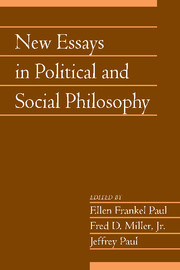Book contents
- Frontmatter
- Contents
- Introduction
- Acknowledgments
- Contributors
- Political Liberty: Who Needs It?
- State Coercion and Force
- Political Legitimacy and Economic Liberty
- Who Owns What? Some Reflections on the Foundation of Political Philosophy
- Human Reproductive Interests: Puzzles at the Periphery of the Property Paradigm
- Why Free Trade is Required by Justice
- Structural Exploitation
- Rescuing Justice from Equality
- Reinterpreting Rawls's The Law of Peoples
- Responsible Choices, Desert-Based Legal Institutions, and the Challenges of Contemporary Neuroscience
- Genocide and Crimes Against Humanity: Dispelling Some of the Conceptual Fog
- Harm and the Volenti Principle
- Education and the Modern State
- Index
Political Legitimacy and Economic Liberty
- Frontmatter
- Contents
- Introduction
- Acknowledgments
- Contributors
- Political Liberty: Who Needs It?
- State Coercion and Force
- Political Legitimacy and Economic Liberty
- Who Owns What? Some Reflections on the Foundation of Political Philosophy
- Human Reproductive Interests: Puzzles at the Periphery of the Property Paradigm
- Why Free Trade is Required by Justice
- Structural Exploitation
- Rescuing Justice from Equality
- Reinterpreting Rawls's The Law of Peoples
- Responsible Choices, Desert-Based Legal Institutions, and the Challenges of Contemporary Neuroscience
- Genocide and Crimes Against Humanity: Dispelling Some of the Conceptual Fog
- Harm and the Volenti Principle
- Education and the Modern State
- Index
Summary
I am developing a hybrid theory of liberal governance that I call market democracy. Market democracy combines insights from classical liberals such as F. A. Hayek with insights from “high liberals” such as John Rawls. Like classical liberal views, market democracy affirms the primary importance of private economic liberty. It sees a wide-ranging right to economic freedom as among the weightiest constitutional rights of liberal citizens. Like views in the high liberal tradition, however, market democracy affirms a robust conception of social justice as the ultimate standard of institutional evaluation. Basic rights and liberties in place, a set of institutions is just only if it is specifically designed to benefit the poor. As a consequence of the scope and weight assigned to economic freedom, market democracy strictly limits the scope of legislative authority in economic affairs. Instead, market democracy emphasizes the use of markets in pursuit of social goals. The distributional requirements of social justice are to be pursued mainly through the forces of spontaneous economic order.
I have long been attracted to the classical liberal and libertarian emphasis on private economic liberty. At its best, I see that emphasis as being based on a robust ideal of agency. Possessing some particular bundle of material goods, for classical liberals, is not nearly as important as possessing those goods because of one's own actions and choices. Free individuals should be aware of themselves as central causes of the lives they lead.
- Type
- Chapter
- Information
- New Essays in Political and Social Philosophy , pp. 50 - 80Publisher: Cambridge University PressPrint publication year: 2013

